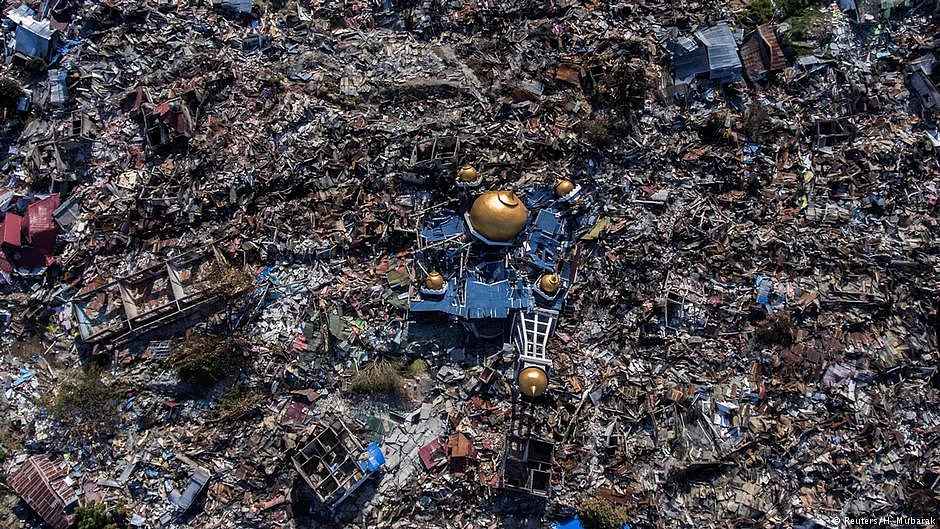Starving Indonesia tsunami survivors outside Palu city plead for aid
Residents of smaller villages outside Palu, suffering from a lack of food, medical attention, fuel and shelter, are angry that aid hasn’t arrived in the days since the Sept 28 earthquake and tsunami

He survived the earthquake and tsunami, yet days have passed since. Taking refuge on the shaded porch of an empty house, Darjan didn't feel relief as he looked out at the mix of broken concrete and shattered lumber that littered the narrow street cutting through his village.
"No help has come at all," he seethed.
Aid has been slow to reach some of the most hard-hit areas of Indonesia following a magnitude 7.5 earthquake and tsunami on September 28, that has now killed more than 1,200 people. Residents of smaller villages suffering from the lack of food, medical attention, fuel and shelter are angry that aid hasn't arrived in the days since the tsunami.
Indonesia's government has struggled to help those who need it after such a large-scale disaster, and relief efforts have focused on the city of Palu, the provincial capital. For days, authorities acknowledged they had little idea about the plight of those in three outlying regencies, home to some 1.2 million people. The Four badly hit districts have a combined population of about 1.4 million. National disaster agency spokesman Sutopo Purwo Nugroho said almost 62,000 people had been displaced from their homes.
In the fishing village of Wani, 33-year-old Darjan said he and his family were safe, but they had lost their home. "This banana is all we have left," he said Tuesday, nodding at the half-eaten piece of fruit in his hand.
Darjan estimated at least 30 people in Wani have died. The official toll of at least 1,234 dead is acknowledged to be low and not yet include those from the outlying, harder-to-reach localities. He said there was an urgent need for food and medicine in Wani, to which another resident, Muhamad Tofik agreed, saying many children were hungry and sick because there was no milk or medicine.
"We feel like we are stepchildren here because all the help is going to Palu," the 38-year-old said.
“Pay attention to Donggala, Mr Jokowi,” one resident in Donggala town yelled in footage broadcast on local television, referring to Indonesian President Joko “Jokowi” Widodo. “There are still a lot of unattended villages here, not only Palu”
As information from Donggala, Sigi and Parigi Muntong regencies has started to trickle in, residents in cut-off townships and villages—many closer to the quake's epicentre—are pleading for help and saying they are being overlooked by rescuers focusing their efforts on Palu city.
"Pay attention to Donggala, Mr Jokowi," one resident in Donggala town yelled in footage broadcast on local television, referring to Indonesian President Joko "Jokowi" Widodo. "There are still a lot of unattended villages here, not only Palu. There are lots of villages in Donggala." Yet even in Palu there was desperation, with signs propped along roads reading "We Need Food" and "We Need Support" and children begging in the streets.
Donggala is a sprawling regency that sits on both sides of a narrow bay, where the shores were devastated by tsunami waves as high as 6 meters (almost 20 feet). Officials have said that assessing the damage there has been made difficult by downed communication lines and impassable roads.
In Wani, villagers said the sea water receded after the earthquake and was quickly followed by an "extraordinary wave" that hit the shore. Buildings along the coast appeared to have been obliterated, with their tin roofs flattened to the ground.
The waves washed fishing boats ashore and a large passenger ship sits on dry land pinned against a building. A green-roofed mosque stands intact, surrounded by wreckage from destroyed homes.
Red Cross calls situation “nightmarish”
International aid organisation The Red Cross described the situation as "nightmarish" and said reports from its workers in one cut-off area, Donggala, a region of 300,000 people north of Palu, indicated it had been hit "extremely hard."
The community of Balaroa had also received no government help sparking outrage among residents as people remain trapped.
A number of disaster personnel arrived in the Balaroa neighborhood on Tuesday morning to assess the damage, and an official visiting from another part of Indonesia that has migrants in Balaroa said the area had been "blended," the Associated Press reported.
Aid needed to prevent stealing
Authorities are expecting the arrival of a special aircraft carrying 12,000 liters of fuel and trucks carrying food, which were en route with police escorts to prevent people from taking supplies.
Indonesian police on Tuesday said they had arrested dozens of people for stealing, with survivors raiding shops for water, food and other necessary goods.
"On the first and second day clearly no shops were open. People were hungry. There were people in dire need. That's not a problem," said deputy national police chief Ari Dono Sukmanto.
"But after day two, the food supply started to come in, it only needed to be distributed," adding that, for the moment, people taking food would still be allowed. However, the theft of other goods, such as electronics, would not be tolerated, Sukmanto said. "If they take laptops, if they take money etc, we are going to act," Sukmanto said. "We have detained 35 people." "There are ATMs. They are open. If people steal, we catch and investigate," he added.
With inputs by PTI and Dw
Follow us on: Facebook, Twitter, Google News, Instagram
Join our official telegram channel (@nationalherald) and stay updated with the latest headlines
